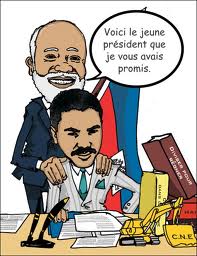Who would believe it? It sounds like the dinosaurs and the compradors are still fighting each other for the presidential palace near downtown Port-au-Prince. It sounds like Haiti’s capital and its surrounding suburbs are still standing, and that below the La Selle pick, one million strong roam the streets undeterred by the uncertainty of the next hour. It sounds like the romantic ballades au claire de lune, the scuba diving in resort beaches near Montruis, Jacmel and Labadie are current events.
It may sound this way, though, but it’s an outright mirage, a political charade, a sleazy masquerade with the sole purpose is to further the inexplicable calamity that has been plaguing the Haitian people since the devastating earthquake last January.
By all accounts, the never-ending misery in which the people of Haiti wallow in a daily nightmare has exacerbated. Two-third of Port-au-Prince lays in ruins, including the national palace over which 19 candidates race each other to a bitter finish. Each claims to be the true Messiah on a biblical mission to rescue the land of Dessalines. According to their logic, before that can happen, they must be empowered by an electoral legitimacy—legitimacy sought not from the Haitian people, but from those who truly control the reins of power in a country on the verge of sinking into history. Shame on them!
On the eve of this election, more than a million Haitians remain homeless and another million of earthquake victims remain internally displaced. Adding to this tragedy is the latest cholera epidemic that has already claimed the lives of more than a thousand people. This latest political show is taking place under the watchful eye of 12,000 UN troops—another vivid reminder that the country’s independence, if not shattered, is clearly in life support.
Lyonel Trouillot, Haitian writer well known in Francophone literary venues, was downright correct in an emphatic assertion he made on France 2’s Kiosque last Sunday. “The Haitian government must be trialed and sentenced for acts of high treasons,” he declared. His face contracted and his brows raised to their highest. When the talk show host asked him to explain why Haitian officials must be put on trail, Lyonel was blunt. “For the abandonment of an endangered people,” he said.
Paola Martiinez Infante, Chilean journalist who was also one of the guests, took pain in saying that is humiliating for all Haitians that their country’s infrastructure is so precarious that the healthcare system is unable to bring under controlled easily manageable diseases such as the Cholera.
A billion dollars was pledged during the donor conference back in April. Haiti has yet to see a third of that money. In Haiti, there is growing suspicion that the real propeller behind the bitter electoral fight is the pledged money, not the masses wellbeing, for the country’s recovery effort.
The main actors of the comedy
Originally, there were 34 of them. That list was substantially reduced to 19. The Provisional Electoral Council rejected 15 of them, including hip-hop star Wyclef Jean, on grounds of ineligibility. Wyclef protested his rejection, claiming it was prejudice against him and what he represents as a member of the Haitian Diaspora. Within the 19 remaining candidates, several of them were made front-runners, for no scientific polling can be conducted in a chaotic theatrical stage. Among them is Mirlande Manigat, 70, a university professor and former Haitian first lady. She is the wife of diehard politico, Leslie Manigat, himself a former president whose presidency lasted just four months in 1988 before being deposed in a military coup ( See: https://csmsmagazine.org/leslie-manigat-and-the-ancillary-findings-part-i/). Milou, known by her nickname, stemmed from the mole of her husband, a specialist in political manipulations and tergiversations. Milou, understandably a vocal critic of Preval, is running under the banner of the Assembly of Progressive National Democrats (RDNP) party and has the backing of an influential group of parliamentarians, the COREH.
The other main actor is 48-year-old engineer, Jude Celestin, who is widely viewed as the candidate of President Rene Preval’s ruling INITE (Unity) coalition platform. He claims to be a newcomer, but this assertion is hard to swallow. Celestin headed the CNE (National Equipment Center) which became notoriously famous during the body collection process in the aftermath of the earthquake. Bodies were collected like dead wild dogs and then dumped in shallow mass graves on the outskirts of the city, left to be eaten by strayed dogs. Government spokeswoman, Marie Laurence Jocelyn Lassegue, defended the body collection process with such a never-seen-before nonchalance, even as all the world news organizations were parading on television creens bird-eaten bodies left to rot in the tropical sun.
An other one in the pack is 63-year-old Jacques-Edouard Alexis. He is a former two-time prime minister who was the original chosen candidate of the Preval camp, but was dropped in favor of the younger Celestin. He subsequently registered as a candidate for the obscure Mobilization for the Progress of Haiti (MPH) party led by Samir Mourra. Samir Mourra?
Next is Michel “Sweet Micky” Martelly, a popular musician and entertainer in the Kompa world, who gained fame for his vulgar lyrics. Martelly is running for the Repons Peyizan party and could be a dark horse contender.
Charles-Henri Baker, 50, is a well-known businessman who finished third behind Preval in the 2006 election. He is also running under the banner of Standing for the Respe party. Let’s not forget former Prime Minister, Yvon Neptune and Aristide advisor, and former head of customs, Leslie Voltaire.
Recalcitrant politicians naturally strive off people misery, and since HAITI is now the equivalent of misery par excellence, one can understand such shameless rush to occupy the crippled Haitian palace. However, all indications suggest that the people may not take a massive part in the charade, which will throw into questions the legitimacy they have been so bitterly fighting for.
Ayiti pa pou van-n ni an gwo, ni an detay. (Haiti is not for sale—neither in whole sale nor in retail prices.)


